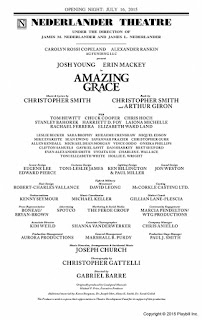"Slaving Away on 41st Street"
While nowhere near the wretch of a show some of its
severest critics would have you believe, AMAZING GRACE, the new musical which
comes to the Nederlander after its Chicago premiere, will nonetheless need what
its title implies if, once lost, it is ever to be found by Broadway audiences. The
show is definitely blessed with a number of virtues that many will find
sufficiently entertaining to keep them in their seats for its two and a half
hours, including an important historical lesson about England’s fight to
abolish slavery in the 18th century, several big-chested songs sung by powerful
singers, a remarkable underwater special effect, and, among other things, the
beloved eponymous hymn (sung so touchingly recently by President Obama), which closes the show in a heartfelt, full-cast choral
blast in which the audience gets to join.
 |
| Stars range from 5-1. |
Newton, by the way, didn’t write the music for “Amazing
Grace,” which, one could argue, is even more affecting than the words (for
nonbelievers, at any rate), and which, following the use of earlier melodies,
was attached to the song in 1835. None of this, however, is mentioned in the
show, in which the hymn plays no part other than as an emotional coda to events
that transpired many years before Newton wrote it; as it is, its direct connection to
those events remains blurred. Despite the perils and suffering Newton endured
during his slave trading years, and the fascination of his story, his contributions
to the abolitionist movement don't seem to have been as significant as this show makes them out
to be.
In AMAZING GRACE John Newton (Josh Young) is the handsome,
dashing, callous, dissolute, and morally misguided son of a powerful slave trader,
Captain Newton (Tom Hewitt); John’s experiences in the trade ultimately lead
him to find God and, in time for the final curtain, to finally turn against
slavery (which he didn’t actually do until years after the show ends). Unlike
another recent musical, HAMILTON, which adheres—despite its hip-hop rhythms—rather
faithfully to historical truth, Christopher Smith and Arthur Giron’s book for AMAZING
GRACE plays fast and loose with who did what (even creating new characters) by
using John’s romantic relationship with Mary Catlett (Erin Mackey), transformed
here into a beautiful abolitionist spy admired for her lovely singing, as a
central fulcrum; their relationship is complicated by a hackneyed love triangle
the third corner of which is represented by the foppish Major Gray (Chris
Hoch), whose mannered speech and behavior serve as the show’s chief source of
humor.
Subplots include Newton’s bond—broken, but eventually
resealed in classic melodramatic fashion—with his black manservant, the nobler
than noble Thomas a.k.a. Pakuteh (Chuck Cooper); Newton’s business association
with a wickedly vampy, campy African monarch, Princess Peyai (Harriet D. Foy),
who sells her own people into slavery; and Newton’s difficulties with his
domineering father. And, oh yes, there’s the discovery of Yema (Rachael
Ferrera), the long-lost child of Nanna (Laiona Michelle), Mary’s black servant,
yet more fodder for the melodramatically inclined.
As in standard-issue history-based musicals, AMAZING
GRACE employs hopefully rousing anthems sung by deep throated baritones,
clarion tenors, and soaring sopranos, but its music, by co-librettist Christopher
Smith (a self-taught former Pennsylvania police officer), while generally melodic, and always well sung, is more earnest than exciting. The solo comic number, Major Gray’s “Expectations,” never
approaches the wit and rhythmic infectiousness of, to choose a prime exemplar, LES MISÉRABLE’s “Master of the
House.” Hearing “Amazing Grace,” you realize just how far
short the music falls of its aspirations (and of LES MIZ, a probable model).
For all their excellent vocal talents (Ms. Mackey was my favorite), the leads—especially Mr. Young—fail to overcome
the two-dimensionality of their characters, even the always admirable Chuck
Cooper being shackled by the stiffness of the writing. Gabriel Barre’s direction isn’t much help in conjuring
believable performances, but he makes the best of the episodic show’s theatrical possibilities, moving the large cast along briskly with the help of Eugene Lee
and Edward Pierce’s flexible sets, frequently dominated by an imposing arrangement
of ship masts and rigging. Christopher Gattelli is responsible for what
choreography there is, although the African dancing in Sierra Leone seems
rather kitschy. Toni-Leslie James’s period costumes are suitably attractive, and
the extraordinary sound design by Jon Weston makes a smashing impact.
As noted earlier, the show includes a spectacular
effect when, after a shipwreck toward the end of act one, the entire stage is brilliantly
lit (by Ken Billington and Paul Miller) to represent the ocean’s depths, as
John’s body sinks slowly into the brine only for the faithful Thomas to appear
from above the proscenium swimming down to rescue his master and end the act. Had the same level of imagination been employed for all other aspects of
the show, AMAZING GRACE itself might not be in as much danger of drowning.
Other
Viewpoints:
Nederlander Theatre
208 West Forty-First Street, NYC
Open run









